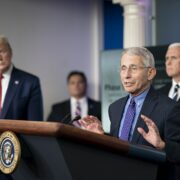
One of America’s iconic brands is facing major trouble, and rising crime in large, Democratic-dominated cities has gotten part of the blame.
CNN reports that “shoplifting reports in 24 major cities where police have consistently published years of data — including New York City, Los Angeles, Dallas and San Francisco — were 16% higher during the first half of 2023 compared to 2019, according to the Council on Criminal Justice analysis.”
Increased losses from organized retail theft, such as when a large group comes into a store and overwhelms security staff by stealing things all at once, has seen major retailers shut down all over the country.
At the end of 2023, Target, noted CNBC, “set off a national firestorm when it said it would close nine stores in four states because theft and organized retail crime had made them too dangerous to run.”
Now it’s Walgreens’ turn.
The Wall Street Journal reports that one of the nation’s biggest pharmacies will be shutting down thousands of stores as crime and Bidenonomics have hit it hard.
Walgreens Boots Alliance Chief Executive Tim Wentworth is taking the struggling chain in a new direction, planning to close a substantial number of poorly performing stores and pulling back on the company’s plunge into the primary-care business.
[The pharmacy chain] will close a significant share of its roughly 8,600 stores in the U.S., Wentworth said in an interview with the Journal. The company hasn’t settled on a final number of locations to close, he said, but it is reviewing about a quarter of its stores that aren’t profitable and could shutter a “meaningful percent” of those over the next few years.
Under review for closures, Wentworth said, are Walgreens stores that are close to one another. The company could efficiently serve consumers with fewer locations in those areas, he said.
Walgreens is also looking at stores dealing with theft and other issues. The company wants to work with cities to try to make those stores sustainable with steps such as “investing in public safety so that our customers and employees feel safe,” Wentworth said.
Walgreens has been one of the prime targets for organized retail crime that has skyrocketed under Biden as many liberals have supported pushes across the country to “defund the police.”
The pharmacy giant is only the latest chain to close locations over economic conditions, according to The Washington Times. Its competition—Rite Aid and CVS Pharmacy—have closed dozens of locations since the start of the year.
“The closures follow Walgreens’ decision to cut its full-year profit outlook this week, dropping its $3.20 profit per share estimate from March down to $2.80 per share.
Walgreens and other retail pharmacies have struggled in the years after the pandemic to recoup retail sales. According to the company’s numbers, Walgreens saw a 4% decrease in retail sales in the second quarter even after slashing prices for more than 1,000 items.”
The collapse of #walgreens has been unlike anything I’ve ever seen in big retail.
It’s down 24% today and has now lost 80% of its value in under 5 years.
This is America’s largest pharmacy chain .. with over 8,500 stores & more than 300,000 employees.
Simply insane. pic.twitter.com/alOmhLWKkO
— Brian Sullivan (@SullyCNBC) June 27, 2024
The Biden administration claimed that there has been a sharp drop in violent crime nationwide but experts have warned that the FBI has likely been cooking the book and that the preliminary numbers are likely overstated.
Fox News noted in April that “an independent group of law enforcement officials and analysts claim violent crime rates are much higher than figures reported by the Federal Bureau of Investigation in its 2023 violent crime statistics.
The Coalition for Law Order and Safety released its April 2024 report called ‘Assessing America’s Crime Crises: Trends, Causes, and Consequences, and identified four potential causes for the increase in crime in most major cities across the U.S.: de-policing, de-carceration, de-prosecution and politicization of the criminal justice system.
The lead authors of the report are Mark Morgan, former assistant FBI director and acting commissioner of U.S. Customs and Border Protection during the Trump administration, and Sean Kennedy, an attorney for the Law Enforcement Legal Defense Fund.
The new report reveals three major findings: that the U.S. faces a public safety crisis beset by high crime and an increasingly dysfunctional justice system; that crime has risen dramatically over the past few years and may be worse than some official statistics claim; and that although preliminary 2023 FBI data shows a decline in many offenses, violent and serious crime remains heightened compared to 2019 data.”
The authors of the study wrote something that should be at the top of everyone’s mind as Trump and Biden likely square off on the topic at Thursday’s debate: “to say crime is down is like descending from a tall peak and standing on a high bluff, saying you are closer to the ground – a true but misleading statement.”
On the Bidenomics front, things have gone from bad to worse. Americans across all age groups significantly reduced their spending between April and June, according to a recent study by TransUnion. Despite declining inflation, many people remain worried about the high cost of living.
“While inflation declined to a 3.3 percent annual rate in May, down from 3.4 percent in April, 63 percent of respondents to TransUnion’s latest quarterly survey said they were extremely or very concerned about the current rate of inflation. For half of respondents, the rise in the cost of living was their primary concern, while 84 percent considered it among their top three worries.
The survey—which measures shifting consumer attitudes and behaviors in the U.S.—found that 39 percent of all respondents said they had cut back on discretionary spending in the past three months. That means they are spending less on fun activities, such as traveling, eating out and entertainment.
Among respondents who said they were concerned about inflation, the share went up to 58 percent.
Sixty-six percent of respondents said they were concerned about the rising price of gasoline; 40 percent were worried about takeout and meal delivery becoming more expensive; and 84 percent feared a rise in the cost of groceries. All the percentages were higher than they were in TransUnion’s 2024 first quarter survey: 11 percentage points higher for gasoline, 7 percentage points higher for takeout and meal delivery, and 4 percentage points higher for groceries,” reported Newsweek.
[Read More: Biden White House Caught In Major Healthcare Scandal]











